- Home
- Nick Carter
The Jerusalem File Page 13
The Jerusalem File Read online
Page 13
"Leila, why did you wait so long?"
"To make love?"
"Yes."
From upside down, she looked up at me. "You don't understand me at all, do you?"
I stroked her hair. "Not very well."
She rolled over, onto her elbow. "It's quite simple, really. I was brought up to be a good Moslem woman. To be all the things I knew I was not. Meek, obedient, reverent, virtuous, a bearer of sons, a servant of men. At first I began to hate all men. Then I simply became afraid Because to surrender would be, you see… to surrender everything. Because to be a woman would mean… to be a woman. Do you understand?"
I waited a while. "A little. Maybe, I guess. I don't know. All men don't ask for total surrender."
"I know," she said, "and that, too, is a problem."
I looked at her. "I don't understand."
"I know," she said. "You don't understand."
The problem was, I did understand, but I travel too light to carry a woman's surrender with me. I just kept quiet.
By the time I felt like talking again, she'd fallen asleep, curled up in my arms. I must have dozed. Maybe forty-five minutes. And then the pinball machine in my head started going, click-bang-click; ideas crashing into each other, hitting walls, bouncing back Lamott.
It all somehow led to Lamott. Lamott who'd posed as Jehns; who'd talked to Robey. Lamott, who'd been waiting in Jerusalem for me.
What else did I know about Bob Lamott?
He was hooked on dope, and he'd made a phone call to someplace in Geneva.
Geneva.
The Shanda Baths was owned by a Swiss corporation.
And Benyamin said the Shanda was a front for dope. Opium, till the Turkish fields were closed. Now it was a small-time hashish business.
Yousef said Khali Mansour pushed hash. Khali Mansour, who'd talked to Robey. Whose brother, Ali, had led me to Rhamaz. Was the boss at the Shanda Baths Khali's connection?
Maybe.
Maybe not.
The boss at the Shanda. His name was Terhan Kal — rrip-crackle. The static had ripped through Benyamin's sentence. Terhan Kal — ooris? The third brother?
Maybe.
And then again, maybe not.
The goons I'd shot on the rooftops in Rhamaz — the same guys who'd staked me out in Jerusalem, who'd watched Sarah's place in Tel Aviv. Something told me they were working for Lamott The guys who Jacqueline was afraid of.
Lamott. It all led back to Lamott. Robert Lamott of Fresco Oil. With his .25 caliber James Bond gun. Like the .25 caliber James Bond bullet I'd found on the floor of the yellow house.
Put it together and what have you got?
Nonsense. Chaos. The pieces fit together and formed no picture. I fell asleep.
I was in a plant store. There were cactus and ivy and philodendron and lemon trees. And orange trees.
A salesman came up to me. He was dressed as an Arab and the headcloth and sunglasses hid his face. He was trying to sell me a lemon tree and said he'd throw in three pots of ivy. He was selling hard. "You really must buy," he kept insisting. "Have you read the latest book? They tell us now that plants can talk. Yes, yes," he assured me. "It is quite true." He smiled greenly. Plants were growing out of his mouth.
The orange trees were at the back of the shop. I said I was looking for an orange tree. He seemed delighted. "A fine choice," he said. "Oranges, lemons, they're all the same thing." He followed me back to where the oranges grew. I walked up to a tree and crack! whang! bullets were flying from a roof across the road. I was out in front of the Kalooris house. I was dressed as a colonel. I was shooting back. The four Arab gunmen fell from the roof in nightmare style slow motion. I turned around. The Arab salesman was still there. He was standing by an orange tree and smiling broadly. A gun was in his hand. He was Bob Lamott.
I woke up in a sweat.
Sat straight up in bed and stared at the wall.
And then it came to me. What had to be the answer. It had been there all along. I'd said it myself. "The matchbook was a plant," I'd told Benyamin, and added: "What I don't like most about that is that anything I find now could be a plant"
That was it. It was all a plant. A carefully plotted elaborate plant Every bit of it. From Khali Mansour telling-tales in El Jazzar — plants can talk — all the way up to the house at Rhamaz. Nothing had happened at the house in Rhamaz. Except that four plants had been murdered there. The house was a plant. The whole trail was a plant A smokescreen, a blind, a decoy.
Now all the loose ends fell into place. All the things that hadn't figured. Why a terror group is hiring workers. Why they encouraged loose talk. Because they were building a false lead, and they wanted the story to get around.
The Mansours and Kaloorises were innocent dupes. They believed everything they were doing was real. But they were being used. By people so smart it made the mind boggle. People who knew they were dealing with hotheads and hop-heads and knew pretty much what to expect. They'd figure that Khali Mansour would sell out and they'd kept in touch with Robey to check out their theory. Then they'd killed both of them to give the story weight.
Only Jackson Robey had figured out the truth. On the drive back from Bhamaz, he'd figured it out. Just the way that I had. Maybe I hadn't doped all the details, but with luck I'd have all the answers. Soon.
And how about Benyamin? What did he know? He must have known something. He'd played it too cool and a little too coy. And he'd planted Leila Kaloud at my side.
I shook her awake.
I said, "I smell a rat." I described the rat.
She looked at me gravely and then she nodded. "Yes. You're right. Shin Bet was led on the same trail as Robey. They also found the bodies in the house at Bhamaz. They also figured the trail was a… what you say… a plant."
"So they set me up to follow a dead end, used me to keep Al Shaitan busy so they — the machers at Shin Bet — could go out and find the real trail. Thanks a lot, Leila. I love being used."
She shook her head silently. "You misunderstand."
"Like hell I do."
"All right then, you partly misunderstand. They also know Robey had cabled AXE. So they think that he may have found the truth among the lies. A truth they missed. They thought if you went on Robey's trail that you might find out — whatever it was. Shin Bet is working hard on this, Nick. Almost every agent…"
"Yeah, yeah. All right. If I were Benyamin, I'd have done the same thing. The point is, it worked."
"What do you mean — it worked?"
"I mean I know where Al Shaitan is."
She looked at me wide-eyed. "You do? Where?"
"Uh uh, sweetheart. The next round is mine."
Nineteen
We breakfasted on yogurt and fruit and sweet tea. Nasr and I. By the rule of his house, the men ate alone. We discussed As Saiqa, the commando group Nasr had infiltrated. Their actions, lately, had centered on native Syrian Jews. Ghettoed Jews. Forced by law to live in ghettos, prevented from working, curfewed off the streets. Given no passports, no freedoms, no phones. Assaulted in the street, slaughtered at whim. If you want to know what happened to anti-semitism, it's alive and well in parts of the Middle East. Jews can't get into Saudi Arabia and they can't get out of Syria at all. I could easily understand many things about the Israelis by picturing a few thousand years of that.
I asked Nasr why he doubled.
He looked surprised. "You ask why I work as a double agent — I thought we had Just been discussing that." He picked up a small cluster of grapes. "This part of the world is very old. And our soil has always been nourished by blood. Read the Bible. It is written in blood. Jewish, Egyptian, Philistine, Hittite, Syrian, Christian, Roman. And then after the Bible was written. The Moslems. The Turks. The Crusaders. Ah, the Crusaders spilled a lot of blood. In the name of the peace-loving Christ they spilled it." He twirled the grapes around in the air. I am tired of eating food grown in blood. I am tired of the endless folly of men, debating right and wrong as though they really knew it. You t
hink I think the Israelis are right. No. I only mink those who wish to destroy them are wrong." He threw down the grapes and started to smile. "And perhaps by such judging, I commit my own folly."
I said I believed that a man has to judge. People pride themselves on saying I don't make Judgments," but some things really have to be judged. Sometimes, if you don't condemn, your silence is a condonation. Or as someone else who once fought for his beliefs said: "If you're not part of the solution, you're part of the problem."
Nasr shrugged. "And the solution creates a new set of problems. In every revolution is the seed of — what? Of the next revolution! But," he gestured with an airy hand, "we must all make our bid the perfect world, no? And the Fates conspire, at times, do they not? I have been of assistance to you and you have been of assistance to me. When we're lucky we believe God has chosen our side."
"And when we're unlucky?"
"Ah! Then we find out if we've chosen God's side. Meanwhile, your second visit to me, coming from that businesslike helicopter, has undoubtedly added to my store of luck. I wonder, is there more I can do for you?"
"Yes. You can keep an eye on Leila."
"This you need not ask, my friend. Ah!" Nasr looked up over my shoulder. I turned and saw Leila standing in the doorway. Nasr stood up. "I think there is one more thing I can do. I can leave you now to say your goodbyes."
Nasr left. Leila started toward me, limping slightly. I told her to stop. I lifted her and carried her to the bench. The moment seemed to call for some sort of Hollywood dialogue. I said: "Someday, Tania, when the war is over, we shall meet on the steps of Leningrad."
She said: "What?"
I smiled. "Never mind." I set her on the bench and sat down beside her. A funny moment with nothing to say. What do you say?
She said, "The French have a proper word. They say à bientôt. Till the next time."
I took her hand. I said, "Till the next time."
She kissed my hand. Then she said quickly, "Just go, will you?"
There was that one moment when my legs wouldn't move. Then I ordered them to cut out the nonsense. I got up. I started to speak. She shook her head. "No. Just go."
I was almost at the door.
"Nick?"
I turned.
"You won't tell me where you are going?"
I laughed. "You'll do well as a Shin Bet agent. Sure, I'll tell you where I'm going. I'm taking the 'copter and I'm flying away."
To where?"
"Where else? To Jerusalem, of course."
* * *
I flew over Jordan and landed at an airstrip outside of Jerusalem. It wasn't that easy. I had to do a lot of very fast talking. From the 'copter radio to the airport tower. Even then, I faced guns when I opened the door. Considering the Syrian colonel costume, I'd still be going through interrogation if it weren't for Uri's magic Aleph. It worked like a Hebrew St. Christopher medal.
I went back to my room at the American Colony, showered, shaved, ordered smoked salmon and a bottle of vodka, and went to work.
I made a plane reservation.
I made a hotel reservation.
I made a third phone call. I told him what to bring and where and when to meet me. I made a fourth phone call. I told him what to bring and where and when to meet me.
I checked my watch.
I shaved off my mustache.
I cleaned and reloaded Wilhelmina.
I got dressed in my own clothes.
I checked my watch. I'd only used up forty minutes.
I packed and checked out Another half hour.
I went out to the courtyard and ordered a drink. I still had another two hours to kill.
The drink did nothing. I was geared for action. I was already there, busting down the door. They were all there. The nine millionaires. And Al Shaitan. Good old Al S. I had to be right. Because I couldn't afford to be wrong anymore. I'd been dead wrong all along.
Now I had a chance to be dead right.
I drank to that.
And there she was. Jacqueline Reine. A handsome police lieutenant on her arm. The waiter was leading them across the terrace, past my table. Jacqueline stopped.
"Well, hello there, Mr… MacKenzie, isn't it?" She was wearing the same blue silk dress, the same blonde silk hair, the same silken expression. I wondered what her picture in the attic looked like.
"Miss… Snow…" I snapped my fingers. "No. It's Miss Reine."
She smiled. "And this is Lieutenant Yablon."
We exchanged mumbled greetings.
Jacqueline said, "Lieutenant Yablon has been so kind. A friend of mine here… committed suicide. A great shock." She turned to Yablon. "I don't think I could have survived without you." She presented him with a dazzling smile.
"Suicide?" I said, wondering if they thought Lamott shot himself and then walked into the trunk, or walked into the trunk and then shot himself.
"Yes. His body was found on his bed."
And I knew exactly who put it there. I gave her a small appreciative nod. She was growing restless. She turned to her lieutenant. "Well…" she said. The waiter arrived with my second drink. I raised my glass. "Le Chaim," I said.
"Le Chaim?" she repeated.
"To suicide," I said.
The lieutenant looked puzzled.
* * *
At five o'clock, I landed in Beirut.
Uri was waiting for me at the airport, dressed in a dark business suit, carrying a heavy-looking piece of luggage and a beat-up plastic Air France flight bag. We hailed separate cabs.
I drummed on my knee as I rode through the city. Beirut has been called a Middle East Paris. It's also been called a parasite. A trading center, a large boutique; it lives off the products of other countries, acts as a giant way-station, a mammoth import-export office. Strip joints, clip Joints, easy money; then, on the other hand, a volatile Palestinian presence, a presence that erupts in raids across the border, in an agitated, agitating left-wing press, in "incidents" against the ruling regime, which survives under Palestinian blackmail.
My cab pulled up at the Foxx Beirut. I got out and paid while a doorman got a bellboy to get the luggage. I saw Uri walk through the gilded doors. I killed another minute and followed him in.
I walked up to the desk. "MacKenzie," I said. "I have a reservation."
"Mr. MacKenzie." The clerk was a dark, good-looking young man. He fingered through a pile of pink slips. "Ah, here we are. Mr. MacKenzie. A single with bath." I signed the register. He told me to wait. A porter would come and show me to my room. Uri waited too. I lit a cigarette and looked around the lobby. White marble all the hell over the place. White carpets with red borders. White sofas and red chairs. White lacquered tables and red-flowered lamps. Two security guards in dun-colored uniforms, .38s bulging in holsters at their hips. Two — no three — plainclothesmen.
And here comes Kelly. Ten minutes late. Kelly and a scuffed-looking leather suitcase.
The bellboy had Uri's bags on a cart. He was piling my bag on, ready to go.
I stepped up to Kelly.
"Say, aren't you…"
"Of course. And you're…"
"MacKenzie."
"MacKenzie. Of course. You here for the…"
"Yes. Exactly. You too?"
"Exactly."
The desk clerk was handing Kelly a pen. I watched him sign in: Tom Myers.
"And how's Maureen?"
"She's fine."
"And little Tom?"
"He's betting bigger every day."
"My, they do grow."
"Yeah, they sure do."
By now, the desk clerk had summoned the porter, and Kelly's luggage was on the cart with ours. The porter said, "Gentlemen?"
We smiled and stepped forward. The elevator opened. The bellboy pulled in the loaded cart. The porter followed him. Then the three of us. The elevator man started closing the door. A short, thick, middle-aged woman with a lacquered beehive and gigantic breasts squeezed her way in through the closing doors.<
br />
"Ten," she said in English, holding up all of her pudgy fingers, flashing diamonds on five out of ten.
The car started up.
"Six," said the porter, looking at our keys. "Six and then seven."
"Eleven," said Kelly.
The operator shot him a look of surprise. "Not possible, sir. Eleven is a private floor. I'm sorry."
"I'm sorry," I said, pulling my gun. Kelly grabbed the operator's arms from behind before he could push any alarm buttons, and Uri grabbed the matron around the mouth before she could let loose a diamond-studded scream.
The porter and the bellboy looked round-eyed scared.
I pressed the Stop button. The elevator stopped. Kelly handcuffed the elevator man and flashed his own police .38. Uri still had his hand clamped over the woman's mouth. "Lady," I said, "you scream and you're dead. You understand?"
She nodded yes.
Uri let her go.
I pressed six. The elevator started. So did the woman's mouth. A mile a minute.
"If you think you can get away with this you're — you're — you're wrong as rain. I'll have you know my husband's an important man. My husband will track you to the ends of the earth. My husband…"
Uri put his hand back over her mouth.
We reached the sixth floor.
Kelly grabbed the three sets of keys from the porter. "All right," he said. "Now we all move out. Quick and quiet. One noise, one gesture, I shoot. Understand?"
The four of them nodded. I told the bellboy to leave the luggage. Uri released his hand from the Mouth. It muttered slowly, "To the ends of the earth."
I opened the door. No traffic out there. Kelly shook the keys and made a half bow. "Room Six Twelve? Right this way, madam."
They marched down the hall. I closed the elevator door. Uri and I dove for the luggage. In Kelly's suitcase were two costumes. Navy blue shirts, pants, and matching Mae Wests. Padded gloves. Tin helmets. Two official-looking I.D. cards. We stripped and started switching to the new clothes. I handed Uri his terrorist medal. "As promised," I said.
"It helped?"
"It helped. You bring the gizmos?"
"Gizmos is right. You put in a big tall order, boychik. You give me four hours to get over the border and tell me you want to pose as a bomb squad."

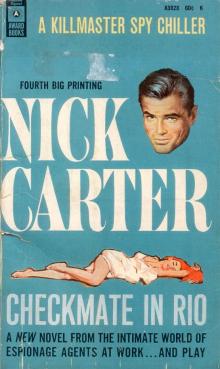 Checkmate in Rio
Checkmate in Rio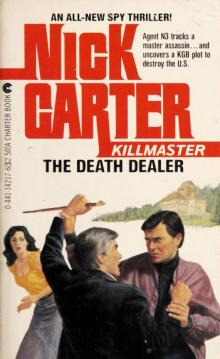 The Death Dealer
The Death Dealer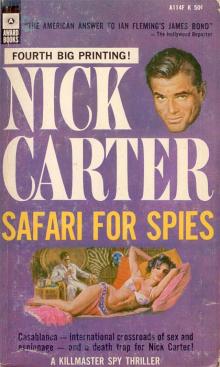 Safari for Spies
Safari for Spies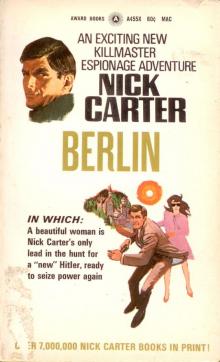 Berlin
Berlin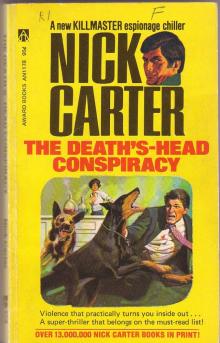 The Death’s Head Conspiracy
The Death’s Head Conspiracy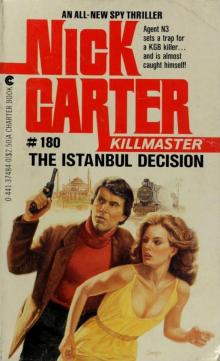 The Istanbul Decision
The Istanbul Decision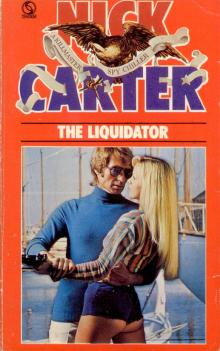 The Liquidator
The Liquidator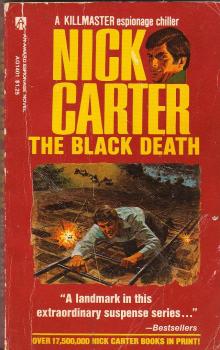 The Black Death
The Black Death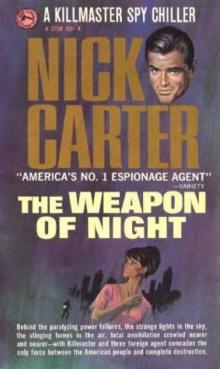 The Weapon of Night
The Weapon of Night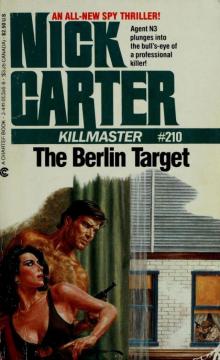 The Berlin Target
The Berlin Target Temple of Fear
Temple of Fear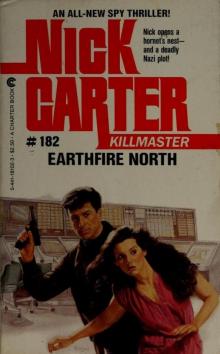 Earthfire North
Earthfire North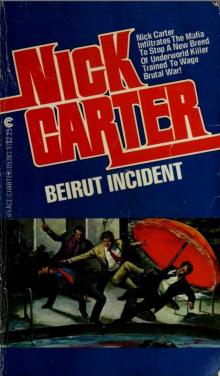 Beirut Incident
Beirut Incident White Death
White Death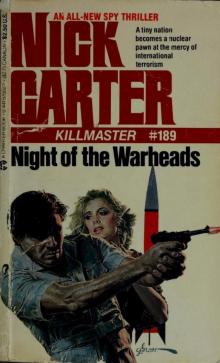 Night of the Warheads
Night of the Warheads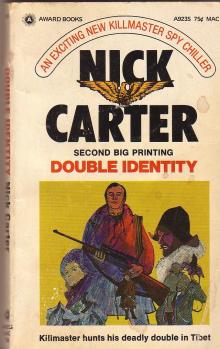 Double Identity
Double Identity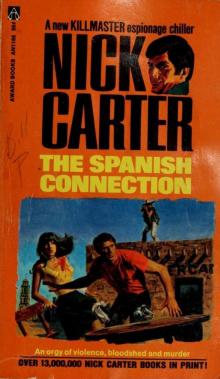 The Spanish Connection
The Spanish Connection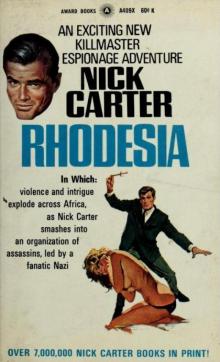 Rhodesia
Rhodesia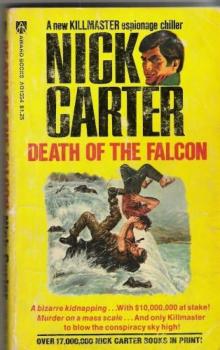 Death of the Falcon
Death of the Falcon The Executioners
The Executioners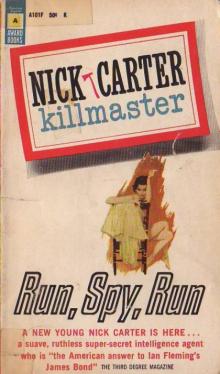 Run, Spy, Run
Run, Spy, Run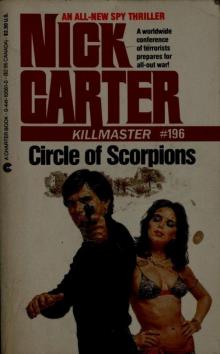 Circle of Scorpions
Circle of Scorpions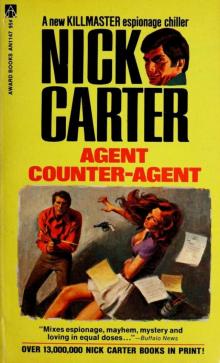 Agent Counter-Agent
Agent Counter-Agent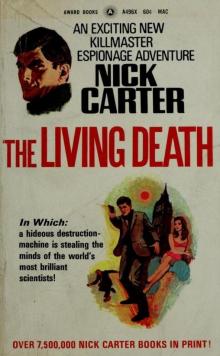 The Living Death
The Living Death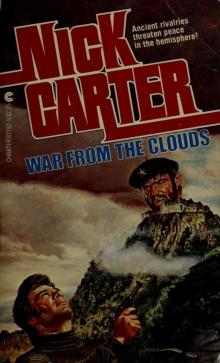 War From The Clouds
War From The Clouds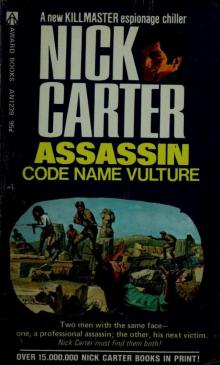 Assassin: Code Name Vulture
Assassin: Code Name Vulture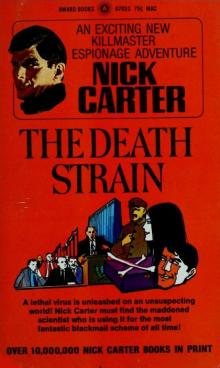 The Death Strain
The Death Strain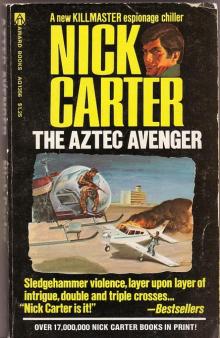 The Aztec Avenger
The Aztec Avenger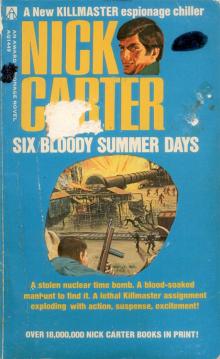 Six Bloody Summer Days
Six Bloody Summer Days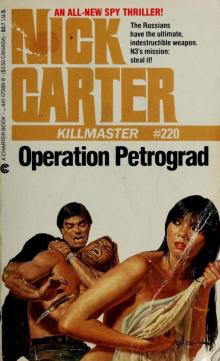 Operation Petrograd
Operation Petrograd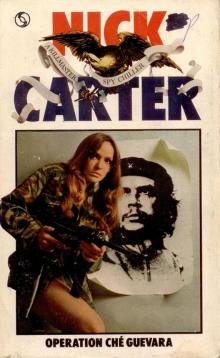 Operation Che Guevara
Operation Che Guevara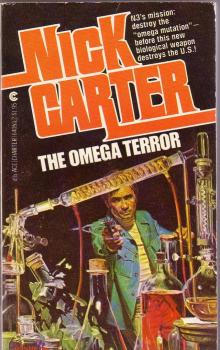 The Omega Terror
The Omega Terror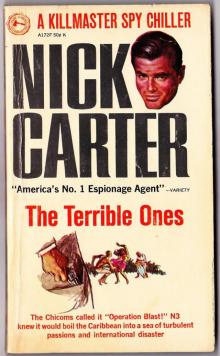 The Terrible Ones
The Terrible Ones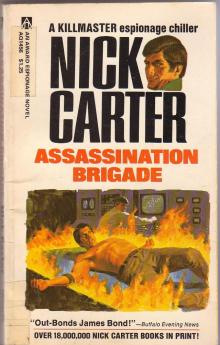 Assassination Brigade
Assassination Brigade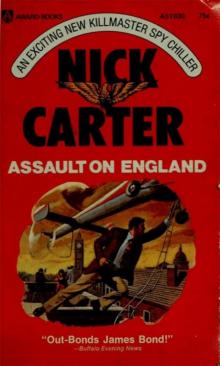 Assault on England
Assault on England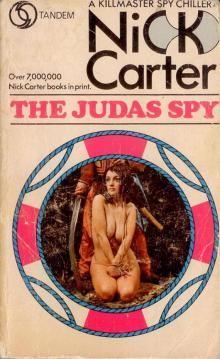 The Judas Spy
The Judas Spy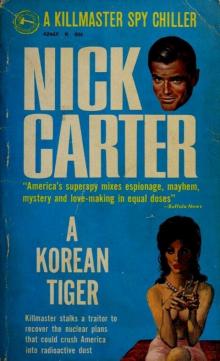 A Korean Tiger
A Korean Tiger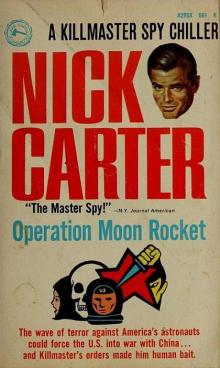 Operation Moon Rocket
Operation Moon Rocket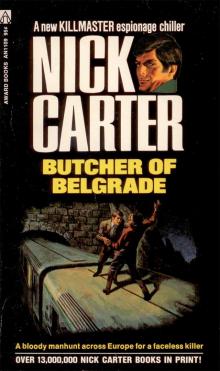 Butcher of Belgrade
Butcher of Belgrade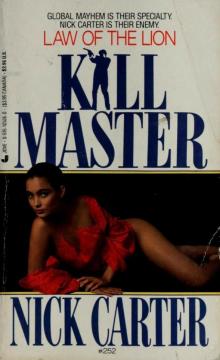 Law of the Lion
Law of the Lion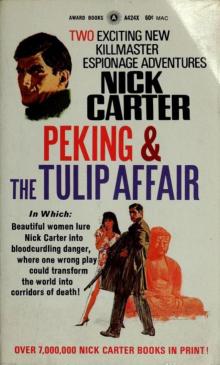 Peking & The Tulip Affair
Peking & The Tulip Affair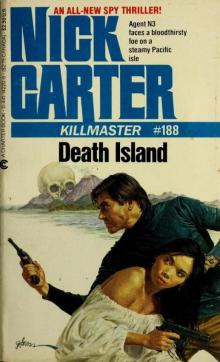 Death Island
Death Island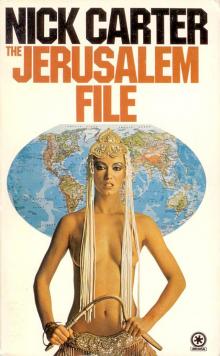 The Jerusalem File
The Jerusalem File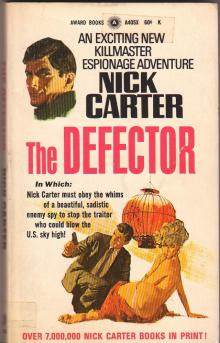 The Defector
The Defector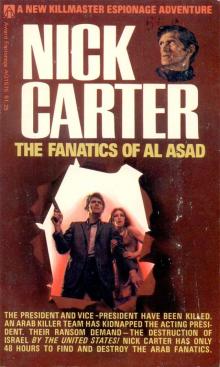 The Fanatics of Al Asad
The Fanatics of Al Asad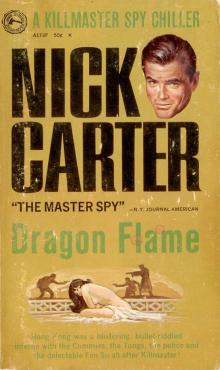 Dragon Flame
Dragon Flame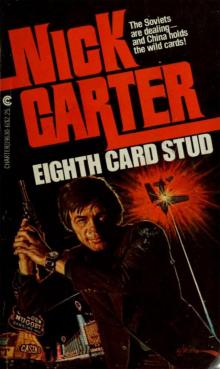 Eighth Card Stud
Eighth Card Stud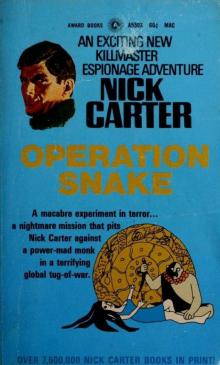 Operation Snake
Operation Snake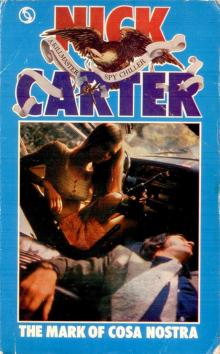 The Mark of Cosa Nostra
The Mark of Cosa Nostra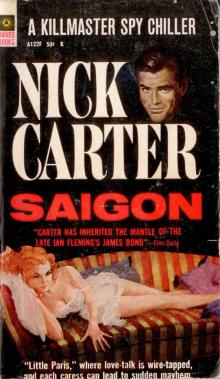 Saigon
Saigon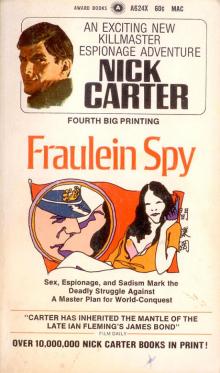 Fraulein Spy
Fraulein Spy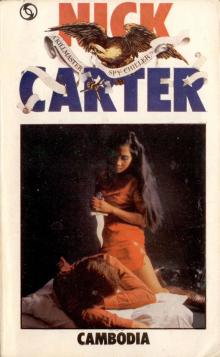 Cambodia
Cambodia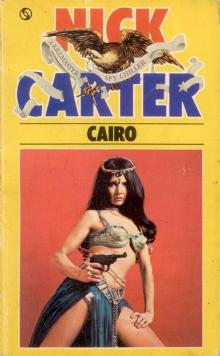 Cairo
Cairo